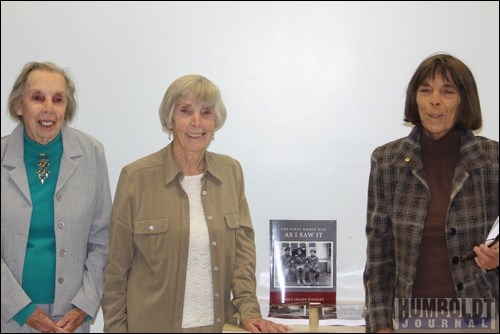Patricia Thomas's grandfather wrote the original manuscript more than 50 years after he returned from the trenches in France. These days it's kept in a large green binder, yellowed pages full of charts and words and memories.
A couple of years ago Thomas, a professor at the University of Saskatchewan, decided her grandfather's words needed to be published. Now they are, in The First World War as I Saw It, by Sergeant Major Percy Leland Kingsley.
Thomas, along with her aunt Theda Haug and mother Mary Thomas, both daughters of Kingsley, visited the Humboldt public library for a reading on June 10.
A native of Picton, Ont., Kingsley arrived in Humboldt by hopping trains, looking for work in tough economic times. He found it here, but a quiet life wasn't in the cards for men of his generation.
In August 1914, only weeks after Great Britain declared war on Germany, Kingsley, 28 at the time, became one of the first people in Humboldt to enlist with the Canadian army. Within months he was fighting on the Western Front, a place defined by death, disease and destruction.
He was severely wounded by a shell at Festubert in May 1915 and spent nearly a year recovering in England.
"The shell shattered his right femur, they wanted to amputate his arm," Thomas said. "He had shrapnel all over him and it continued to move around - they didn't get it all."
Decades later, his body was still riddled by those pieces of metal.
"I remember him showing his arm, saying 'That's a piece of shrapnel', and you could see it moving around under his skin," Thomas remembered.
Kingsley saw action in some of the war's most famous - and infamous - battles, including the Somme, Vimy Ridge and Passchendaele.
He returned from Europe alive, if not unscathed, and settled back in Humboldt to raise a family before moving to Saskatoon, where he wrote his memoir in the early 1970s. It sat around for nearly 40 years before Thomas took up the cause of getting it published. She started by transcribing her grandfather's notes onto her computer and finding a publisher in Winnipeg.
Unlike many veterans, Kingsley didn't hesitate to talk about his experiences in the war. While living in Humboldt after the conflict, he spent plenty of time at the legion
"My impression was that he would talk about the war continuously," Thomas said. "He would sing little songs to himself and he'd laugh. And the girls didn't want to hear him."
"We were interested in other things," Mary interrupted with a laugh.
Having married at 21, Mary moved to the United States, never truly understanding her father until reading what he had written so many years ago.
"I never really knew him until I read the book," she said.
Now she does, and so will many others.




